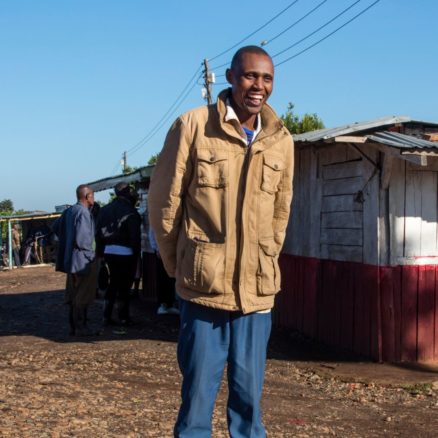
‘This good life makes me feel happiness’: Kipkoech, shop owner
Kipkoech Bernard Cheruiyot was having a hard time supporting his family as a farmer. An unpredictable climate in Kenya’s Bomet County meant frequent droughts often affected his yield, making it hard to earn a profit that would support his wife and three children.
After learning the basics of shopkeeping from Hand in Hand, though, Kipkoech, 31, has found the financial freedom he had long desired — and now has his sights set on becoming a wholesaler.
“Before, when I was only doing farming, I did not see much profits,” Kipkoech said. “When I started this business, I see how much my life has changed.”
Bomet County, Kenya
Competing for success
Poverty in Bomet County is rife: 42.9 percent of households have a combined income of less than US $3.20 a day, according to the Kenya Red Cross Society.
Agriculture is the primary means of employment in Kenya, a trend that’s particularly emphasised in Bomet, where government statistics show there are 58,000 registered farmers, primarily in tea and coffee. That competition, combined with unsteady conditions, can create plenty of volatility in the market — and financial uncertainty among the general population.
Fundamentals for success
Kipkoech, whose wife Winny does not work, was worried his family would go hungry when he learned about Hand in Hand’s Self-Help Groups, generously supported by the IKEA Foundation
Keen to expand his economic horizons, Kipkoech joined the group and learned the fundamentals of entrepreneurship, from how to start a business to the ways to make it successful.
Using the group’s Merry-Go-Round table banking initiative, he secured a loan of KES 10,000 (US $100) in November in order to set up a shop in the Kipsarwet Shopping Center, where he sells sugar, baking flour, soap, tea leaves, cooking oils, rice, maize flour and bread.
Although he acknowledged the early morning hours can be difficult, he believes they are the reason why the shop has been a success.

“I start every morning around 6 a.m.,” Kipkeoch said. “At that time, there are many customers — mostly students who like to buy pens, books, snacks. Waking up early, I can get to know them and help them before my neighbours start to open two hours later.”
Regular customers continue to arrive in the late morning hours, often buying bread, sugar and tea leaves. Kipkoech then closes the shop for the day around 4 p.m., allowing him to relax at home and go running, and it remains closed on the weekends, when he focuses on running his onion farm.

A whole new future
Whereas profit was hard to obtain as a farmer, Kipkoech has realised how much running the shop has changed his life.
“When I started to keep records, I started to see the difference,” he said. “In a day I could make KES 1200 (US $12), or maybe even as much as KES 1500. I know how much I make.”
Not only does he expect to have the original loan repaid by the time it comes due in November, he has been able to change his family’s lives as well. Already, he has built a new three-room house and bought new furniture, and he has been able to afford the fees to move his daughter, 10, into private schooling so that she may better achieve her goal of becoming a doctor.
His ambition doesn’t end there. Within the next three years, Kipkoech would like to expand his business and become a wholesaler. He believes the principles he learned from Hand in Hand have prepared him to apply for a government loan that would help make that happen.
At that point, he believes he’ll be able to make KES 10,000 (US $100) a day — a fortune vastly different from that of a year ago.
“When I look back, a lot has changed,” Kipkoech said. “I have changed my home and improved my children’s education. This good life makes me feel happiness.”
Kipkoech’s results
Learned fundamentals of shopkeeping
Guaranteed a steady income for family
Built new three-room home
Next case study: Meet Gloria, the former refugee growing crops – and profits
